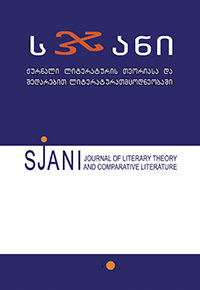"მგზავრის წერილების" პაროდია და ირონია პოსტკოლონიალური თვალსაზრისით
Parody and Irony of "Letters of Traveler" from the Postcolonial Point of View
Author(s): Hayate SotomeSubject(s): Sociology of Culture, Theory of Literature
Published by: ლიტერატურის ინსტიტუტის გამომცემლობა
Keywords: Postcolonialism; Orientalism; Ilia Ch’avch’avadze; Parody; Irony;
Summary/Abstract: Russian orientalism studies reveal the facts that Russian poets and writers have created a lot of works about Georgia and Caucasus for centuries, perceiving the place as Russian Orient. For Russians, Georgia and Caucasus were the places inhabited by wild, violent and unenlightened people. When many scholars of Russian literature engaged themselves in the studies of Russian orientalism, they perceived Orient from Russian point of view only. This concept is criticized by H. Ram’s term, “Peter’s paradigm.” Now we must look at the paradigm from oriental point of view, regarding this thoughts and representations by oriental people. Ilia Ch’avch’avadze is a national canonical writer of the 19th century Georgia, and his early prose work “Letters of a Traveler” have been estimated as his literary manifesto. This work illustrates all thoughts and feelings of a traveler during his travel from Vladikavkaz to Tbilisi, after leaving the university of St. Petersburg, and expresses the pain the author suffered from seeing the situation of colonized Georgia. It should be noted that I. Ch’avch’avadze, who regards Georgian language as one of the gifts from the God and establishes the Society for Spreading Literacy among Georgians, uses Russian sentences written with Cyrillic script in the work. We should consider the style as the ironic signs defined by literary theorist L. Hutcheon. By employing the signs, the writer notifies the readers about his own ironic intention to criticize Russian orientalism and colonialism. Ch’avch’avadze’s parody and irony derive from works of Russian poets: A. S. Griboedov’s “The Woes of Wit”; A. S. Pushkin’s “The Winter Load”; N. V. Gogol’s “Dead Souls”; M. J. Lermontov’s “The Hero of Our Time.” Using parody and irony, he discusses tsarists Russia’s colonial discourse; the main discourse to justify colonial rule is enlightenment of Georgia. On the one hand, a Russian coachman described by the author in first chapter of the work is represented as an ugly and lazy man. One of examples of this ugliness is shown by his abusive words which are written in Russian. Here we can feel parody and irony of Gogol’s “Dead Souls, “ in which a Russian coachman represents tsarists Russia’s satisfaction. Also, the representation of Russian coachman in “Letters of a Traveler” is a parody of hierarchical structure of colonial situation. In general, it is often local people who play role of coachman when writers of Russian literature represent Caucasus. However, in Ch’avch’avadze’s work, this structure is inverted; the traveler is Georgian and the coachman is Russian, and the former hires the latter. Furthermore, in third chapter the traveler meets a Russian officer, who eloquently preaches to the traveler about the greatness of enlightened Russia and the need of enlightenment for Georgia. However, the writer ironically and humorously indicates the fact that the officer is not enlightened enough to look down on the traveler, who in fact studied at university and now is going back to his homeland. Readers can easily notice this fact not only from senseless conversation of the officer, but also from his two sentences written in Russian. One of them is a citation from Lermontov’s “Hero of Our Time,” the parody of which is made by the author in another part of this work as well, and in which a Russian officer looks down on local people. The other sentence is a Russian idiom. With the help of the idiom, concerning the “scientific invention” which prevents his servant from stealing sugar, the author emphasizes the officer’s shallow understanding of European scientific thought.Thus, Ch’avch’avadze criticizes tsarists Russia’s colonial rule for the reason that, in comparison with Europe, Russia is clearly less enlightened. Therefore, its justification of colonial rule of Georgia becomes pointless. This argument is clearly shown in first chapter; when the traveler leaves Vladikavkaz, his new French acquaintance laughs at his Russian coach and coachman because of technological backwardness of the coach and ugly behavior of the coachman. Needless to say, this episode is ironically resonant with the colonial discourse the Russian officer delivers in third chapter. However, we should note that the object The French laughs at is the traveler itself as well. Despite the fact that his work was banned from publishing due to his severe criticism to tsarists Russia, shouldn’t think that he simply denies Russia’s importance. Of course, he criticizes Russia’s tsarists, colonialism and orientalist, but he simultaneously acknowledges the value of Russian culture, literature and thought of his contemporary progressive thinkers. He played an important role in bringing European (and Russian as well) progressive thought to Georgia in order to save Georgia(n) from colonialism. Ilia Ch’avch’avadze shares European thought with Russian contemporaries, that is the reason why he employed parody and irony; he tries to look at Russian empire from – in Hutcheon’s phrase – “critical distance.” When we read “Letters of a Traveler,” we must consider this intertextuality, which is indicated by parody and irony.Now there arises a question; should we reevaluate this attitude toward Europe from the postcolonial point of view, since Euro centrism is one of the main problems of postcolonial studies.
Journal: სჯანი
- Issue Year: 2017
- Issue No: 18
- Page Range: 197-208
- Page Count: 12
- Language: Georgian

